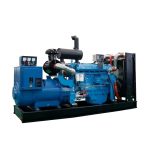Introduction
In modern electrical power systems, the need for reliable and stable power supply is paramount. The demand for electricity continues to rise, and with the increasing integration of renewable energy sources such as wind and solar power, the challenges of maintaining grid stability have become more pronounced. One critical aspect of power system stability is the management of reactive power, which plays a crucial role in maintaining voltage levels and ensuring the efficient operation of the grid. In this article, we will explore the role of diesel generators in providing reactive power support in electrical systems.
Reactive Power and Its Importance

Reactive power is a vital component of electrical power systems that is necessary for maintaining voltage levels and ensuring the proper functioning of electrical equipment. Unlike active power, which is responsible for performing useful work, reactive power does not perform any mechanical work but is essential for establishing and maintaining the electric and magnetic fields in an alternating current (AC) system.
Reactive power is measured in units of volt-amperes reactive (VAR) and is necessary for supporting the transmission and distribution of electrical power. When there is an imbalance between the reactive power supplied and the reactive power consumed in a system, voltage fluctuations and instabilities can occur, leading to equipment failures and disruptions in power supply.
The Role of Diesel Generators in Providing Reactive Power Support
Diesel generators are widely used in power generation applications due to their reliability, flexibility, and ability to provide backup power during outages. In addition to supplying active power, diesel generators can also be utilized to provide reactive power support in electrical systems. By operating in parallel with the grid and injecting reactive power into the system, diesel generators can help stabilize voltage levels and improve the overall performance of the grid.
One of the key advantages of using diesel generators for reactive power support is their fast response time. In situations where there is a sudden increase in reactive power demand or a voltage dip in the system, diesel generators can quickly ramp up their output to provide the necessary reactive power support. This rapid response capability makes diesel generators well-suited for addressing transient voltage fluctuations and maintaining grid stability.
Furthermore, diesel generators can be easily integrated into existing power systems and can be deployed at strategic locations to enhance the overall reliability and resilience of the grid. By strategically placing diesel generators in areas with high reactive power demand or voltage instability, utilities can improve the power quality and ensure a more stable supply of electricity to consumers.
Operational Considerations for Using Diesel Generators for Reactive Power Support
When using diesel generators for reactive power support, several operational considerations need to be taken into account to ensure optimal performance and efficiency. One of the key factors to consider is the sizing of the diesel generator to meet the reactive power requirements of the system. Properly sizing https://www.lkpowerplant.com/160kw-400kw/ ensures that it can provide the necessary reactive power support without overloading or underutilizing the equipment.
In addition to sizing, the control and coordination of diesel generators with other reactive power sources in the system are essential for maintaining grid stability. Advanced control algorithms and automatic voltage regulation systems can be implemented to ensure that the reactive power output of the diesel generators is coordinated with other sources such as synchronous condensers or static VAR compensators.
Maintenance and monitoring of diesel generators are also critical aspects of ensuring reliable operation and performance. Regular maintenance checks, including fuel quality inspections, lubrication system inspections, and cooling system checks, are essential for preventing unexpected failures and ensuring the longevity of the equipment. Real-time monitoring of key operating parameters such as voltage, frequency, and reactive power output can help operators identify potential issues and take proactive measures to prevent system disturbances.
Case Studies and Applications
Diesel generators have been successfully deployed for reactive power support in a variety of applications and scenarios. In regions with limited access to grid-connected power sources, diesel generators can serve as a reliable and cost-effective solution for providing reactive power support to isolated electrical systems. By integrating diesel generators with energy storage systems or renewable energy sources, such as solar panels or wind turbines, off-grid communities can improve the stability and reliability of their power supply.
In industrial settings, where sensitive equipment and processes require stable and high-quality power supply, diesel generators are often used to provide reactive power support and ensure uninterrupted operation. By installing diesel generators with automatic voltage regulators and power factor correction systems, industrial facilities can mitigate the impact of voltage fluctuations and maintain the desired power quality standards.
Furthermore, in emergency situations such as natural disasters or grid failures, diesel generators play a crucial role in providing backup power and reactive power support to critical infrastructure such as hospitals, data centers, and telecommunications facilities. The reliable and fast response capabilities of diesel generators make them an essential component of emergency preparedness plans and resilience strategies for ensuring continuity of essential services during adverse conditions.
Conclusion
In conclusion, diesel generators are versatile and reliable assets that can provide valuable reactive power support in electrical systems. By leveraging the fast response capabilities and flexibility of diesel generators, utilities, industries, and off-grid communities can enhance the stability, reliability, and resilience of their power supply. Proper sizing, control, and maintenance of diesel generators are essential for optimizing their performance and ensuring effective operation in providing reactive power support. As the demand for electricity continues to grow and the integration of renewable energy sources increases, diesel generators will continue to play a crucial role in supporting the stability and efficiency of electrical power systems.
